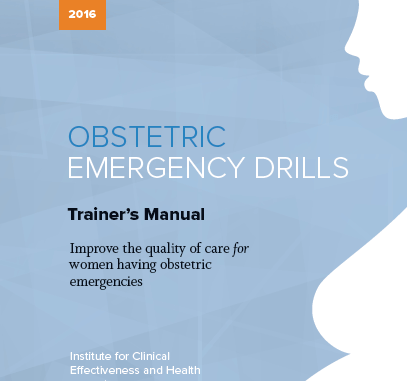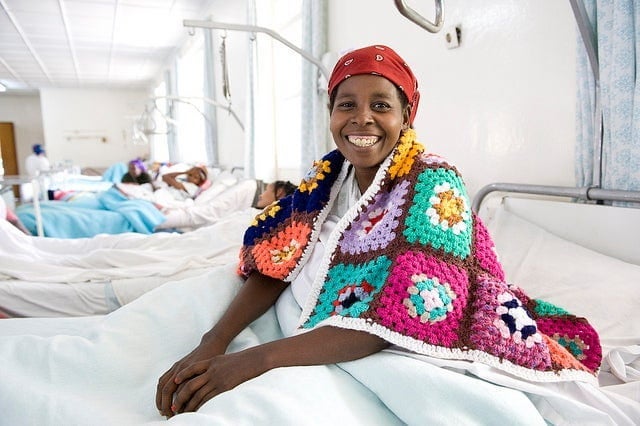Maternal Health Task Force
The Maternal Health Task Force strives to create a strong, well-informed and collaborative community of individuals focused on ending preventable maternal mortality and morbidity worldwide.
677 Huntington Avenue
Boston, MA 02115
Blog
-
New Resource for Managing Postpartum Hemorrhage and Pre-eclampsia/Eclampsia Now Available
We are excited to announce the release of the Obstetric Emergency Drills Training Kit, a free resource available for clinicians anywhere in the world! This manual and accompanying resources were developed by the Institute for Clinical Effectiveness and Health Policy from Argentina and the Maternal Health Task Force. It is our hope that, when combined, these resources are invaluable for clinicians seeking ways to prepare for obstetric emergencies…read more

-
Tracking Perioperative Mortality: Lessons Learned From the Maternal Mortality Ratio
The Lancet Commission on Global Surgery currently estimates that 5 billion people lack safe and affordable surgical and anesthesia care when needed. To assess this inequity, the Commission seeks to refine the perioperative mortality ratio (POMR), an indicator that measures the number of all-cause deaths before discharge in patients who have undergone a surgical procedure. A recent commentary published in The Lancet Global Health, co-authored by Ana Langer, Director of the Women and Health Initiative at Harvard T.H. Chan School of Public Health and the Maternal Health Task Force, explores what policymakers who are working on improving the POMR can learn from the established maternal mortality ratio…read more
-
International Day of Action For Women’s Health: Ensuring Respectful Maternity Care
As we celebrate International Day of Action for Women’s Health on 28 May, we reflect on the physical, emotional and psychosocial dimensions of women’s health as well as the reasons to support girls’ and women’s health throughout the lifecycle. With Sustainable Development Goal (SDG) 5 calling for an end to all forms of discrimination against all women and girls everywhere, the elimination of all violence against women and girls and universal access to sexual and reproductive health and rights by 2030, now is the time to draw attention to the many elements of and impediments to women’s health and rights, including obstetric violence, an often underrecognized and overlooked threat to women’s rights to respectful maternity care…read more
-
Women Delivering Babies at Home With No One Present Is Unacceptable
The phenomenon of giving birth with no one present (NOP) is concentrated in regions of the world with the worst maternal and newborn indicators, such as Nigeria, Niger, India, Tanzania, Kenya, Uganda and Ethiopia. Delivering with NOP brings untold suffering to women and children, including permanent disability and maternal and newborn deaths. There are, however, steps the maternal health community can take to decrease the number of women who deliver with NOP in the short- and long-term…read more
-
Building Awareness of the Link Between Fistula and Gender-Based Violence
In light of International Day to End Fistula on May 23, it is imperative to work towards minimizing occurrence of fistula by building awareness around conditions that contribute to and result from this morbidity. A study examining the relationship between fistula and violence conducted by the DHS program shows yet another disheartening correlation between gender-based violence and poor health outcomes for women. It provides even more impetus for training and sensitivity for women’s health care providers in this area…read more
-
International Day to End Obstetric Fistula: Ending Fistula Within a Generation
In honor of today, International Day to End Obstetric Fistula, we’ve compiled resources related to obstetric fistula, a serious and tragic health condition that impacts the lives of women and families around the world. The maternal health community can support this year’s theme of ending fistula within a generation by promoting universal access to high quality emergency obstetric care, treatment, and social support…read more

-
New Jobs in Maternal and Newborn Health!
Interested in a position in maternal and reproductive health? Every month, the Maternal Health Task Force rounds up job and internship postings from around the globe…read more
-
Promising Innovations for Maternal Newborn Health from WD2016
The 2016 Women Deliver Conference in Copenhagen, Denmark just wrapped up and we are left feeling inspired and invigorated. The conference was a wonderful chance to reconnect with colleagues, meet fellow advocates, and tap into exciting developments in the field of maternal newborn health. One of the most promising projects proposed several innovations to the labor and delivery ward to improve intrapartum care in low-resource settings…read more
-
Recommitting to Maternal Newborn Health at WD2016
The 4th Global Women Deliver Conference opened with a roaring start in Copenhagen, Denmark on Monday afternoon with more than 5,500 delegates from over 150 countries. At such an extensive global gathering, it can be difficult to choose which sessions to attend. Interested in learning more about maternal newborn health at WD2016? We’ve compiled a list of key sessions to attend throughout the week! …read more
-
New Videos on WHO Guidelines for Newborn Care Now Available
With the Sustainable Development Goals calling for a global reduction in neonatal mortality to at least as low as 12 per 1,000 live births by 2030, we must make every effort to share lessons, practices, and resources related to newborn health. To this end, Global Health Media recently released a set of seven short videos that teach health workers how to follow new and innovative WHO guidelines for ill newborns. Watch, download, and share the newborn care videos! …read more